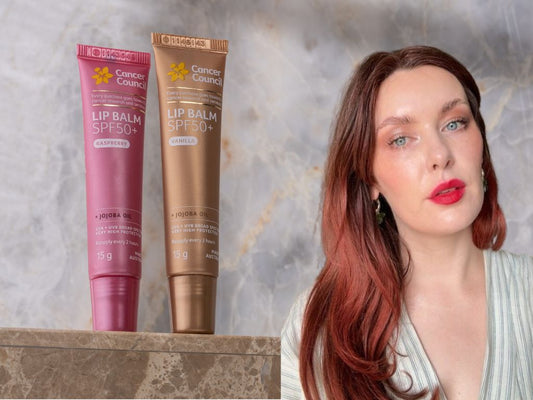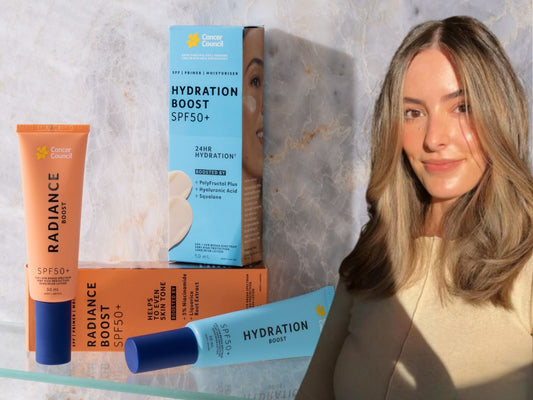'Wear sunscreen every day' is probably one of the most common pieces of skincare advice you hear (and with good reason). Both UVA and UVB rays are hard at work every time you step outside, and understanding how they affect your skin is key to preventing premature aging and long-term damage.
UVA vs. UVB: What's the Difference?
Both UVA and UVB rays are forms of ultraviolet radiation emitted by the sun, but they cause different types of skin damage.
- UVA Rays: These long-wave rays slip past your skin’s surface and head straight to the dermis (the deep layer of your skin), breaking down collagen and elastin, the stuff that keeps your skin firm and bouncy. This can cause photoaging—fine lines, wrinkles, sagging skin, and dark spots that sneak up on you over time. Rain or shine, they’re penetrating your skin, even through windows. Think of UVA as 'A' for aging.
- UVB Rays: These short-wave rays primarily attack the epidermis (your skin’s outer layer). They’re the reason you’re reaching for aloe after a day in the sun—UVB rays cause sunburns and are linked to skin cancers like melanoma. These rays are at their peak during summer and between 10 a.m. and 4 p.m, but they can still pack a punch if you’re unprotected, no matter the season. Think of UVB as 'B' for burning.
Let’s Talk Photoaging
Skin aging refers to the natural changes that occur as we get older. However, photoaging is when the sun prematurely—and sometimes dangerously—ages the skin.
When your skin is exposed to the sun without protection, UV rays can lead to immediate effects like sunburn and more long-term issues, such as hyperpigmentation, loss of elasticity, and the development of wrinkles. These rays also accelerate the breakdown of collagen, contributing to premature aging.
Sunscreen plays a crucial role in shielding your skin from the harmful effects of ultraviolet (UV) radiation, primarily UVA and UVB rays. While UVC rays from the sun don’t reach the Earth’s surface, both UVA and UVB rays penetrate the atmosphere and can cause significant damage to the skin over time.
By using sunscreen daily, you form a protective barrier that minimises the damage caused by UV rays, helping to maintain skin’s youthful appearance and health.
Choosing The Right Sunscreen
When selecting a sunscreen for daily use, several factors come into play, including SPF level, formulation, and the product’s finish on the skin.
Sunscreens are typically available in either mineral or chemical formulations. Chemical sunscreens use ingredients like octinoxate, oxybenzone, and avobenzone, which work by absorbing UVA and UVB rays and converting them into heat, which is then released from the skin.
On the other hand, mineral sunscreens (also known as physical sunscreens) contain zinc oxide or titanium dioxide and act by reflecting and scattering UV light. Since heat can sometimes irritate the skin, mineral sunscreens or those containing zinc oxide are often a better choice for individuals with sensitive skin.
Your Daily Sun Protection Plan
To guard against both types of rays, broad-spectrum sunscreen is a must. Here’s what you need to know:
- SPF (Sun Protection Factor): measures UVB protection but not UVA, so always look for broad-spectrum on the label.
- Apply generously: Think a shot glass for your body and a teaspoon for your face, and reapply every two hours (more often if you're swimming or sweating).
- Don’t forget tricky spots: Lips, ears, and hands need protection, too.
Product Picks - Face
- Cancer Council Hydration Boost SPF50+: A multitasking daily SPF moisturiser that provides a protective moisture barrier while giving skin a firm, smooth look and feel.
- Cancer Council Face Day Wear SPF50+: For added coverage, this SPF offers sun protection with a subtle tint to keep your skin looking fresh and even-toned.
Product Picks - Body
- Cancer Council Ultra Sunscreen SPF50+: A non-greasy formula that’s water-resistant for up to 4 hours, making it ideal for outdoor activities.
- Cancer Council Sport Sunscreen SPF50+: Perfect for active days, this sunscreen provides broad-spectrum protection with a sweat-resistant formula.
- Cancer Council Sensitive Sunscreen SPF50+: Formulated for sensitive skin, this sunscreen is free from fragrance, parabens, and oils—making it a great option for those who experience regular flare-ups.
The Vitamin D Debacle
It’s true that sunscreen reduces vitamin D production, but just a few minutes of sun exposure here and there is enough to keep your levels in check. For peace of mind, you can always take a vitamin D supplement without putting your skin at risk.
The Bottom Line?
To avoid your share of burnt shoulders, rosy cheeks, and peeling noses, not to mention wrinkle schminkles, full-body protection from UVA and UVB rays is essential. Love thy SPF and make it a daily habit, rain or shine––your future self will thank you.



